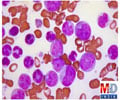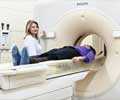Proton radiography imaging used prior to and during proton treatments for pediatric cancer patients provides for more accurate treatment delivery and a lower dose of radiation compared

Pediatric cancer patients are also more susceptible to radiation induced malignancies and toxicities from both diagnostic and therapeutic radiation. Researchers investigated pediatric patients with various cancers to evaluate the use of proton radiography as well as nonpediatric lung tumors to evaluate the ability of proton radiography to allow real-time tumor tracking while the patient is breathing.
The images were compared to both diagnostic quality X-ray portal images and digitally reconstructed radiographs from CT data. They found that proton radiography provided higher quality images to determine tumor location and to use during daily quality assurance checks and tumor tracking with less radiation than an X-ray or CT scan.
"Proton imaging techniques have been around in the field of proton beam therapy for over 30 years; however, poor image quality reduced its use in mainstream proton oncology centers. In recent years, novel developments in detector technology, very fast (pico-second) electronics and single-event reconstruction imaging have allowed a significant improvement in the quality of the images, which can benefit ultimately proton oncology." Shannon MacDonald, MD, a study author and radiation oncologist at Massachusetts General Hospital in Boston, said.
"The development and enhancement of proton imaging has the advantage of allowing for a further decrease in radiation delivery to healthy growing tissues outside of the tumor, which is so important when treating children."
Source-Eurekalert
 MEDINDIA
MEDINDIA




 Email
Email










